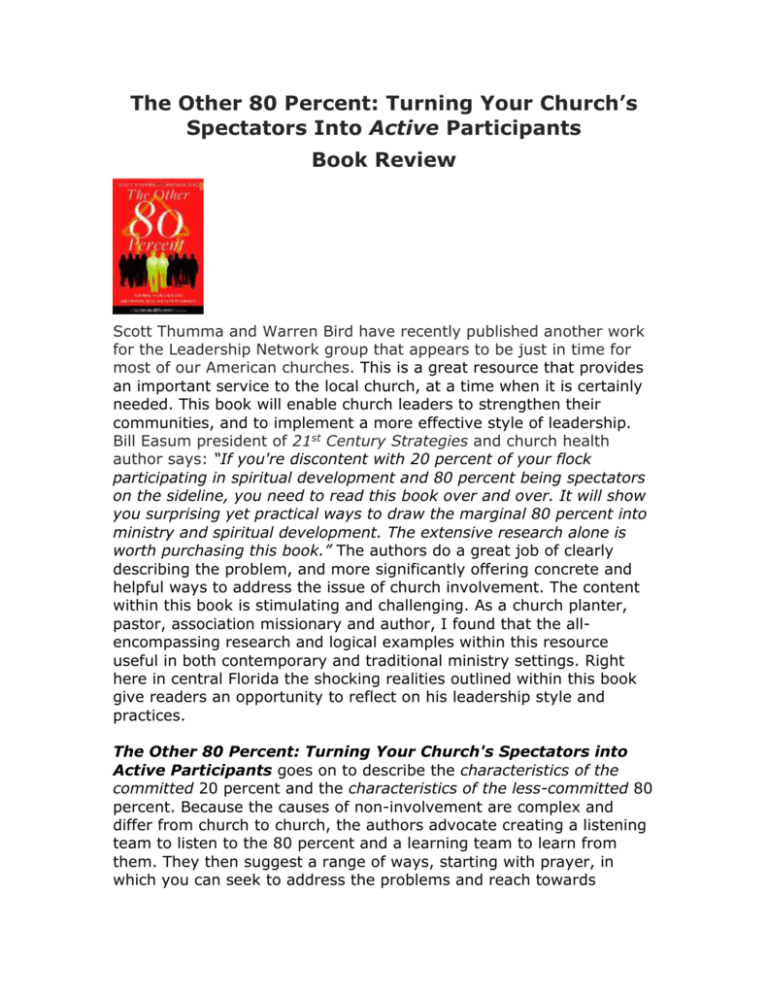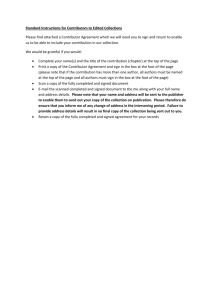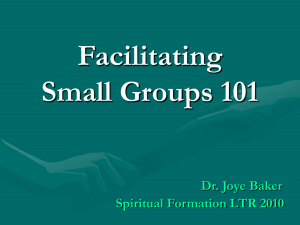The_other_80_percent_book
advertisement

The Other 80 Percent: Turning Your Church’s Spectators Into Active Participants Book Review Scott Thumma and Warren Bird have recently published another work for the Leadership Network group that appears to be just in time for most of our American churches. This is a great resource that provides an important service to the local church, at a time when it is certainly needed. This book will enable church leaders to strengthen their communities, and to implement a more effective style of leadership. Bill Easum president of 21st Century Strategies and church health author says: “If you're discontent with 20 percent of your flock participating in spiritual development and 80 percent being spectators on the sideline, you need to read this book over and over. It will show you surprising yet practical ways to draw the marginal 80 percent into ministry and spiritual development. The extensive research alone is worth purchasing this book.” The authors do a great job of clearly describing the problem, and more significantly offering concrete and helpful ways to address the issue of church involvement. The content within this book is stimulating and challenging. As a church planter, pastor, association missionary and author, I found that the allencompassing research and logical examples within this resource useful in both contemporary and traditional ministry settings. Right here in central Florida the shocking realities outlined within this book give readers an opportunity to reflect on his leadership style and practices. The Other 80 Percent: Turning Your Church's Spectators into Active Participants goes on to describe the characteristics of the committed 20 percent and the characteristics of the less-committed 80 percent. Because the causes of non-involvement are complex and differ from church to church, the authors advocate creating a listening team to listen to the 80 percent and a learning team to learn from them. They then suggest a range of ways, starting with prayer, in which you can seek to address the problems and reach towards spiritual maturity for 100 percent of your congregation. The author’s premise is posed in a question: “How can you shift more of your church members from sitting to serving, from being spectators to engaging more deeply? Would doing so help more people to grow and develop spiritually?” Gary L. McIntosh, professor of Christian ministry and leadership, Talbot School of Theology, Biola University remarks: “Who is not interested in seeing more people involved in their church? Then place The Other 80 Percent: Turning Your Church's Spectators into Active Participants at the top of your reading list. Employing fresh research, authors Scott Thumma and Warren Bird offer insights that will empower your work with your less-active people.” The Other 80 Percent is a practical guide for church leaders written by respected researcher Scott Thumma and noted author Warren Bird. The authors draw upon new research across a broad range of Protestant attenders and churches of all sizes. They have listened to thousands of church members' voices to discern what motivates lessconnected, inactive members to move toward a life of discipleship and of living out the faith in community. The authors explore societal norms influencing involvement and identify distinctive qualities of churches that shape patterns of better volunteer participation. They also examine the sometimes faulty and limiting perspectives leaders have about ways to increase involvement. The book proposes practical steps to develop listening and learning teams to assist clergy in uncovering membership patterns, cultural norms, and leadership blind spots common to Evangelical and mainline congregations alike. The Other 80 Percent includes a wealth of creative ideas that can expand what it means for people to engage more fully with their church. Thumma and Bird reinforce the idea that spiritual growth is directly related to participation and involvement and that spiritual nurturance of the entire congregation should be at the heart of this effort. In a typical church 20 percent of the people does 80 percent of the church work, but that does not mean that all of your focus should be on the 20 percent. In business you can often maximize profits by concentrating your energies on the top 20 percent of your clients, but the biblical standard for kingdom ventures if different. The authors' research reveals that the general trend to lack of participation in the life of a church is attributable to a number of causes: Individualism and consumerism have infected the sheep and made them less willing to follow. Some Christians have experienced disappointment with the church as they know it, and now want a life of faith apart from the church. Church leaders are partly to blame for setting expectations to low and exercising leadership poorly. The problem is partly an organizational one, requiring rethinking of the activities of volunteering and committee work. The problem is also a spiritual problem, arising from a lack of understanding of what it means to be a follower of Jesus. Pick this book up right away, read it as soon as possible, and begin putting it into practice immediately. I found the book very helpful, and highly recommend it to all our church leaders around central Florida.





